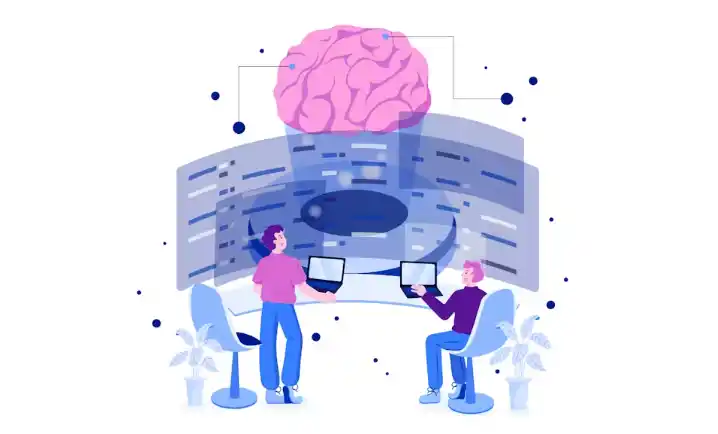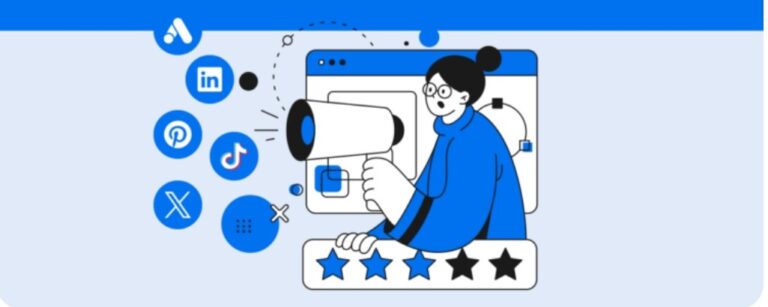Check out the benefits of artificial intelligence in marketing and sales, how to use it in each sector, and how to generate more efficient reports with AI
Artificial intelligence in marketing and sales is transforming the industry, providing businesses with powerful tools to understand and interact with customers more effectively than ever before.
From advanced content personalization to process automation, artificial intelligence in marketing and sales is essential for shaping strategies that drive results across all stages of the funnel.
As a result, businesses that invest in this technology achieve higher levels of audience segmentation, operational efficiency, and experiences more aligned with consumer needs.
If you’re not sure yet what benefits AI in marketing and sales can bring, and how to use it strategically, don’t worry. We’ve prepared this guide to help you dive deep into the topic. Here’s an overview of the content you’ll find in this guide:
- What is artificial intelligence?
- What are the benefits of artificial intelligence in marketing and sales?
- How to use artificial intelligence in digital marketing?
- How to use AI for sales?
- AI and marketing and sales reports
What is Artificial Intelligence?
Artificial intelligence is a field of computer science that focuses on developing systems and technologies capable of performing tasks that would normally require human intelligence.
In other words, AI aims to create machines and programs that can learn, reason, make decisions, and solve problems in ways similar to or even more advanced than humans.
To achieve this, these systems use complex algorithms, artificial neural networks, and large datasets to learn from past examples and continuously improve their own performance.
There are even different types of AI, from specialized models that perform specific tasks to general systems designed to

When it comes to marketing and sales, artificial intelligence is used to analyze consumer data, automate repetitive processes, personalize customer interactions, predict buying behaviors, and optimize marketing campaigns.
As a result, these applications have the potential to transform the way businesses engage with their customers and run their operations.
What are the benefits of Artificial Intelligence in Marketing and Sales?
Artificial intelligence offers a wide range of benefits for marketing and sales, enabling businesses to significantly improve their strategies. Some of the key benefits include:
- Advanced data analysis: AI can analyze large volumes of data in real time, identifying patterns and trends that would be difficult to detect manually. This helps businesses better understand customer behavior and make more informed decisions.
- Efficient personalization: Based on customer data, AI can create highly personalized experiences, from product recommendations to individualized communications. This increases the relevance of interactions and the likelihood of conversion.
- Intelligent automation: By automating repetitive tasks such as email marketing, customer service, and lead qualification, AI frees up time for marketing and sales professionals to focus on more strategic activities.
- Precise segmentation: AI algorithms can segment customers based on specific characteristics and past behaviors, enabling more targeted marketing campaigns.
- Trend forecasting: Using machine learning techniques, AI predicts market trends and customer behavior, helping businesses adapt faster to changes and anticipate customer needs.
- Real-time optimization: Adjusting budgets, channels, and messaging to maximize return on investment (ROI) in ad campaigns and other content.
- Better customer engagement: AI-powered chatbots and virtual assistants can interact with customers 24/7, providing immediate and personalized support.
- Cost reduction and increased efficiency: By automating processes and improving campaign effectiveness, AI allows for operational cost reductions and greater overall efficiency in marketing and sales teams.
Ultimately, these combined benefits help businesses improve customer experience, boost sales, and maintain a competitive edge in an increasingly digital and data-driven market.
How to Use Artificial Intelligence in Digital Marketing?
There are several ways to use artificial intelligence in digital marketing to boost campaign performance and improve customer experience.
AI-powered resources are already present in major tools in the market, such as Google Ads, Meta Ads, content creation platforms, and even data analysis tools like Reportei.
Here are 5 of the main ways to apply AI in digital marketing, with examples of tools that feature intelligent functionalities:
- 1. Predictive analysis and personalized recommendations
- In many tools, AI algorithms are used to analyze customer data, such as purchase history, previous interactions, and website browsing behavior, to identify patterns, preferences, and new audience segments. Based on this, more personalized recommendations can be provided to achieve business objectives and focus on future actions.A great example of this is in Google Ads, which now uses AI to suggest bid optimizations—focusing on the channels that generate the most conversions—and reach new audiences to maintain high relevance and maximize ROI.
- 2. Intelligent chatbots
- Implementing AI-powered chatbots on your website or tool to assist with customer inquiries, guide the purchase process, or provide personalized support is a way to stay ahead of the competition and stand out to customers. In addition to being responsible for ChatGPT— which anyone can access — OpenAI also provides an API that helps create custom assistants for businesses, which can operate in various formats. In Reportei, for example, we have this tool to offer Instagram assistants, paid traffic management, email marketing, and automation. This way, our clients can chat with these chatbots in real time to obtain more accurate analyses and insights for their marketing strategies.
- 3. Advanced audience segmentation
- As mentioned earlier, artificial intelligence plays a key role in audience segmentation, as it can analyze and identify patterns from large amounts of data on user interests, behaviors, and demographic characteristics. In addition to Google, one platform that uses this resource most is Meta Ads. Through Advantage+ campaigns, creating and distributing ads more customized by leveraging machine learning and AI is possible.
- 4. Real-time campaign optimization
- Many tools using AI in paid traffic campaigns allow real-time adjustments, whether it’s campaign budgets, offers, or even audience targeting.In other words, they automatically detect when improvements can be made and optimize the process so that clients get the best return in the shortest amount of time. Once again, Google Ads and Meta Ads are good examples of platforms increasingly investing in artificial intelligence in digital marketing.
- 5. Automated content generation
- One of the most common uses of AI for marketers is automating the creative process, as AI can help create ads and better posts for social media.For example, ChatGPT is widely used to develop texts and captions, suggest content aligned with audience needs, and create outlines for different digital channels.In conjunction with this, tools like Canva have AI capabilities to generate images and videos from user input, which helps improve efficiency and scalability in daily workflows.
These examples show how artificial intelligence can be incorporated into different aspects of digital marketing, from automation and personalization to advanced data analysis and customer interactions.
Thus, by strategically adopting AI, businesses can improve team efficiency, increase customer engagement, and significantly boost sales.
How to Use AI for Sales?
Speaking of sales, artificial intelligence also plays an important role in this sector. After all, through AI, it is possible to identify the best opportunities, personalize approaches, and optimize the daily routine of sales teams to make them more efficient.
Many CRM tools, for example, already provide artificial intelligence features not only to automate processes but also to personalize experiences.
Below, we’ve selected the key tips and tools for using AI in sales, going beyond chatbots. Read on!
1. Lead Analysis and Qualification
To start, AI in sales can be used to analyze lead data and identify those with the highest likelihood of conversion.
With this, algorithms help classify contacts based on demographic, behavioral, and intent characteristics, allowing salespeople to focus on the most promising ones.
A good example of a tool that uses artificial intelligence for sales is Hubspot’s CRM. Through its features, it is possible to provide the team with the most relevant data and insights to ensure a more effective approach to leads.
2. Proposal and Presentation Personalization
Another interesting application of artificial intelligence in this sector is the personalization of proposals, presentations, and sales pitches based on the specific needs of the customer.
Through AI-powered text generation tools, it is possible to develop customized proposals in real-time, incorporating relevant information and recommending the most suitable content for each persona.
The Sales Pitch Generator from RD Station is a great tip for those looking to create more impactful pitches when closing deals with customers. Just specify the topic to be presented and click “Generate pitch” to see the magic happen!
3. Follow-up and Reminder Automation
By implementing sales automation systems that use artificial intelligence, it is possible to automatically track leads, send follow-up emails (with AI-generated content), and set reminders for important tasks.
This helps maintain contact with potential customers and ensures that no lead is neglected during the process.
HubSpot’s CRM once again serves as an example in this regard, as it offers both AI-based email automation and activity tracking features, along with insights to better understand the path the customer is following.
4. Sales Forecasting and Performance
Just as with artificial intelligence in marketing, machine learning algorithms can also be used to predict sales trends, enabling businesses to set realistic goals and identify areas of opportunity.
Many tools, such as RD Station and HubSpot, use AI to analyze CRM reports, historical data, customer feedback, seasonality, and other factors to accurately predict future sales performance and determine what actions teams need to take to address potential issues.
These are just a few ways artificial intelligence can be applied in the sales process to increase efficiency, improve customer engagement, and boost results.
AI in Marketing and Sales Reports
As we’ve seen above, artificial intelligence plays an essential role when it comes to data analysis. Therefore, it is an important tool for generating more efficient marketing and sales reports for projects.
Among the most important uses of AI in reporting, the following are worth highlighting:
1. Advanced Data Analysis
The analysis and cross-referencing of large volumes of data is a powerful application of AI in marketing and sales reports. AI can process this information quickly and efficiently, identifying patterns, trends, and insights that human intelligence may not spot immediately.
Additionally, AI can predict future trends and potential outcomes, helping teams anticipate market demand and proactively adjust their sales and marketing approaches.
In other words, with advanced data analysis, reports become not only descriptive but also predictive, allowing analysts more time to work with actionable insights to drive growth and competitiveness in businesses.
2. Report Automation
With artificial intelligence, it is possible to automate the collection, analysis, and generation of reports, reducing time spent on manual tasks and enabling quicker, more informed decision-making.
Through report automation, teams can integrate multiple data sources—such as CRM data, website analytics, paid traffic campaigns, and social media—into a single AI-powered system. This makes comprehensive, real-time analysis of marketing and sales performance much easier.
An example of a tool with this feature is Reportei AI, which generates comprehensive data analysis in just a few seconds—something we will explain in more detail later.

This allows the team not only to increase operational efficiency but also to provide deeper and more actionable insights to optimize campaigns and guide sales strategies.
In other words, it is a fundamental tool to drive growth and competitiveness in businesses within our highly data-driven landscape.
3. Investment Optimization and ROI
By using artificial intelligence in marketing and sales reports, companies can analyze detailed data to understand which investments generate the best returns and where resources should be allocated to maximize impact.
This makes it possible to track and attribute specific results to each marketing channel, campaign, or sales initiative. This allows for a precise evaluation of the performance of different strategies, identifying which ones generate the highest ROI and which need to be adjusted or reallocated.
Finally, this data-driven analysis enables smarter resource allocation, minimizing waste and maximizing results.
4. Decision-Making Assistance
Assistance in decision-making is one of the main advantages of artificial intelligence in marketing and sales reports. After all, the analyses provided by AI offer actionable insights and recommendations based on accurate, real-time data, making strategic and informed decisions easier.
As a result, analysts can anticipate demands, adjust strategies, and make proactive decisions to boost marketing and sales performance.
Moreover, AI can provide personalized recommendations based on each customer’s preferences and history, guiding teams on the most effective approach for each negotiation. This enhances the effectiveness of interactions and improves the customer experience.
This and the other applications above demonstrate how AI can transform marketing and sales reports, making them smarter, more accurate, and data-driven. In other words, by integrating a solid system into their operations, companies can gain a significant competitive advantage by maximizing the potential of their data and insights.
Reportei AI: Data Analysis Tool with Artificial Intelligence
Now that you understand the importance of artificial intelligence for marketing and sales reports, it’s worth exploring Reportei AI, a tool that streamlines your analysis and provides more accurate insights into your digital strategies. Here are the main features of the tool:
Automatic Analyses in Reports
When creating reports in Reportei, you can set them up to receive analyses automatically made with AI, offering complete interpretations of the data collected from each platform.
In other words, in just a few seconds, you can save time reading and cross-referencing the data collected by the tool, gain valuable insights, and identify trends and opportunities that help in decision-making.
Paid Traffic Management Assistant
This is a chatbot that helps analyze the main metrics of paid traffic campaigns on platforms such as Google Ads, Meta Ads, TikTok Ads, and more!
The paid traffic management assistant performs analysis based on one of four objectives:
- Account overview;
- Increase CTR;
- Reduce CPC;
- Study the metric with the lowest performance during the period.
Once this is done, the assistant not only delivers an interpretation of what happened but also suggests improvements for the future. Additionally, it’s possible to continue the conversation and request even more precise tips for the project.

Instagram Assistant
Also in the chatbot format, the Instagram assistant helps your profile grow on the platform by providing tips and analyses focused on increasing brand perception or boosting profile engagement.
Thus, in just seconds, the chat responds with personalized ideas to make your content more relevant and enhance your presence on this highly important digital channel.

Email Marketing and Automation Assistant
Our last assistant is the email marketing and automation one, which helps in analyzing email strategies and workflows to enhance lead nurturing and relationship-building actions.
This way, you can ask the chatbot for an overall interpretation of account performance, the best campaign sent during the period, or the most effective ongoing workflow.

The features of Reportei AI are available in all accounts for testing, whether for analysis in reports or in the assistants area.
However, for those who want to go further, it is possible to subscribe to a full AI plan, which provides more credits to perform analyses and gain more accurate insights across all projects. Just choose the plan that best suits your needs and start enjoying the benefits.
Take advantage of the opportunity to explore Reportei AI plans and start your free AI trial in marketing and sales reports!



